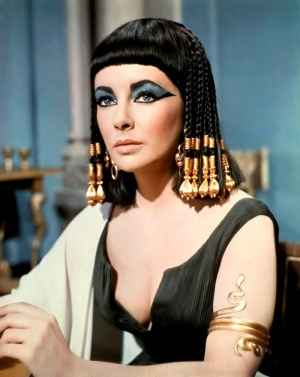The Cyclical Pattern of Hollywood White-Washing
Hollywood has long been known for and criticized for the numerous white-washed roles that cast Caucasian or Caucasian-looking actors in the roles of other races and ethnicities. The minority representation in movies is often stereotyped and thus perpetuates the racial and ethnic stereotypes that persist in greater America. We’ve all seen a movie with an African-American actor playing a slave, an Asian-American playing a nerd, and a Latino actor playing a drug-dealer, and there are all appropriate times when this should occur. But the African-American, Asian-American, and Latino experiences cannot and should not be whittled down to these tropes.
Historical Racism

The earliest films historically cast white actors in non-white roles. Since the inception of the film industry, minority roles have often gone to white actors. Among the most recognized are Katharine Hepburn as Jade Tan in Dragon Seed and Elizabeth Taylor as Cleopatra. One of the earliest films, Birth of the Nation (1915) employed blackface on white actors for African-American actors. While these casting decision might have been expected during an era of racial segregation and oppression, Hollywood has continued to make casting decisions that prefer white actors over minority actors. In the last decade, Jake Gyllenhaal was cast in Prince of Persia: Sands of Time and Justin Chatwin as Goku in Dragonball Z. Films and marketing often go hand in hand and in order to produce revenue, the roles are given to people who not only act, but can produce revenue for the film. Based on the cyclical nature of the film industry, well-known actors are given more roles and few well-known actors are minority, so it is difficult for minority actors to become established in the industry. Films have acted as social barometers, producing what sells to make profit and pushing the boundaries of society. Films have normalized interracial and LGBTQ relationship much more than in the previous decades and they have the potential to continue to be progressive. The difficulty is progressivism breeds controversy and controversy doesn’t always sell.
Awards

The Academy Awards and Cinema, though it claims to be, is not a universal institution at this time. The award ceremonies make that clear. Only 1% of Best Directors have been female (Kathryn Bigelow), none have been African-American and this year, and Alfonso Cuaron was the first Mexican to win the award. Since many movies are produced in the hopes of either being a blockbuster hit, or an Academy award winner (or both), producers lend towards making films that will please a predominately-white, predominately-male voting demographic. Only nine Best Actor awards have been given to African-American men. The pandering for awards has led to a movement towards writing characters that will be able to win awards and given the Oscar’s history, minorities have not been favored. It is possible that an unconcious bias from the voters, to prefer characters and storylines that are more relatable sways the winners towards that of the voting demographic.
Cultural Appropriation

One of the justifications, of the film industry is to fill roles with well-known actors to help increase the revenue of the film. Due to the limited knowledge of many minority actors, fully capable of playing the roles, bigger named stars are often given preference. Because of the dissonance of white actors playing non-white role the stories are sometimes completely appropriated to “fit” into the American culture. While there was an earlier, Japanese version, the United States’s remake of Hachi: a Dog’s Tale featured Richard Gere as the protagonist, now named Parker Wilson instead of Hidesaburo Ueno. The movie is filmed and set in Rhode Island and the only things remnant of the original story is the name of the dog, Hachiko, and the general storyline. Other than the fact that Richard Gene is more well-known than most Asian-American actors, there was no need to set the story in the United States, nor was it necessary to have a white protagonist.
The casting of a white man instead of an Asian or Asian-American actor shows an appropriation of the Japanese folkloric tale. Other than the dog’s name, there is little reference to the real owner, Hidesaburo Ueno or the Japanese culture or location. As in many white-washed movies, the story is removed from the native culture and transplanted into the Hollywood setting.
White-Washing Heroes

Even more caustic, however, is when biographical roles with stunning achievements are white-washed and attributed as a white achievement. One of the notable instances of this was in Oliver Stone’s World Trade Center film (2006). Both of the two characters who rescued the protagonist, Sgt. Jason Thomas and Sgt. Dave Karnes, were cast as white actors. Sergeant Thomas is played by William Mapother, a white actor, however, in real life, he is an African-American man. Biopics like World Trade Center, have a moral obligation to get the facts right in order to preserve and educate the audience on the facts of the event.
Oliver Stone’s careless and unprofessional casting of William Mapother as Sergeant Jason Thomas rewrote a lesser known part of 9/11 history to favor whites. Instead of celebrating African-American heroism, the acts of Sergeant Jason Thomas are incorrectly and unjustifiably attributed to the white narrative. More disturbing than the white-washing of fictional characters, the casting decision has redefined this man’s identity and changed his race.
The necessity of stopping white-washing stems from the simple fact that everyone deserves to see themselves reflected in film to show the endless possibilities that life can offer. The roles written by and for minority actors need to be broadened to not only have the stereotypical roles, but demonstrate all possibilities and narratives of these communities. It is time that cinema progresses to reflect all people and not just the minority that it currently reflects.
What do you think? Leave a comment.











I loved your analysis on this subject! Such a well-written article!
The fact is, and it really saddens me, is Hollywood doesn’t care.
Hollywood is run and owned by caucasians. If you want to stereotype, Hollywood is run by Jews.
Their real agenda is not going to be pushing for minority equality or anything ethical. It is going to be to make money, and make a lot of it.
Hollywood is an industry. The same way McDonalds doesn’t care about cows is the same way Hollywood will not care about ethnic representation.
The key is, is to boycott any clear indication of whitewashing so that they don’t make money from you. Support independent cinema and birth new stars who may be ‘non-white’ and do something positive.
I agree with all of this, but just to correct you, Caucasian doesn’t equal White. Its even further white washing because the term was used to refer to the most beautiful race when white folk found skulls in the caucasus region (between Europe and Asia) and they considered them beautiful but because they were all about white supremacy, they refused to accept that these ‘beautiful’ skulls belonged to anyone that wasn’t white (because non-white races can’t possibly be beautiful duh) and so the term ‘Caucasian’ spread to mean the same as racially white. In fact, caucasians are actually Georgians, Armenians, Jews, even North Africans and Indians (plus more).
The worst in my opinion is The Last Airbender. It is bad whenever white directors white wash their movies but for a director of Asian descent (M. Night) to white wash what should have indeed been an Asian-centric movie is ridiculous.
Hmmmm… Elizabeth Taylor as Cleopatra. Though she and the Ptolemys ruled Egypt for many years, they were of Greek origin, not Egyptian. Last I checked – a Greek woman isn’t classified as a woman of color.
Though Cleopatra was of Greek ancestry, there remains some debate on her race. The maternal side of her ancestry is debatable, with evidence suggesting that her mother may have been of a mixed race. Though Cleopatra is unlikely to have been more than 1/2 of another race, there is suggestive evidence that she may have Egyptian or Persian blood.
Keep Thinking! Keep Writing! The world needs you.
Great analysis.. I agree, every single individual is unique in his or her own ego experience. Humanity should not be conditioned to put such standards on physical appearance. Hollywood, why recreate a historical piece and use racially distorted actors? This completely takes away from the historical aspect. I loved “Hachiko” but the entire movie I was disappointed it strayed from reality so much.. it was unnecessary to morph it into the Hollywood setting. Thanks for the interesting discussion!
This is so ridiculous they turn white characters to other ethnicities in movies also. Where is the article on that? Where are the people bickering over that? They also use Latin actors to portray Asian characters. Yet I see no mention of that. Hollywood doesnt just whitewash they colorwash when they see fit for what ever reason. Hollywood should stay true to the stories they portray. Not switch out a White character for a Black one just to have a Black actor bring in the Black audience, or Switch the main Character to a White one because they think White people wont see the movie.
What movies are you speeking. I’d like to check them out. Thank you
Hollywood doesn’t owe us anything. They only exist to make money — not to right cultural injustice.
Yes, but unfortunately a LOT of people look to Hollywood for justification of cultural norms.
I just remembered that Richard Gere was in another American remake of a Japanese film- “Just Dance With Me”, he’s on a role!
I got that wrong, it was “Shall we Dance”
I still don’t think appropriating stories from different cultures is at all offensive…Hollywood wants to remake a Japanese film, why not have it star Richard Gere? Art is all about appropriation.
Mexican-American Edward James Olmos as the Haitian-hating self-proclaimed “mulatto dictator” of the Dominican Republic in “In The Time of Butterflies” is up there, along with basically the entire cast of that film. The Mirabal sisters were lighter-skinned but not as white as the actors who portrayed them.
I think it’s really easy to say, “That’s just the way Hollywood is.” The Film Industry has an incredibly large impact on our daily lives. Think of how many people form conversations built on references to television shows and movies. When all you see is white heroes, white protagonists, and grossly stereotyped minorities, it makes it more acceptable to map this skewed perception of the world onto real life. While it can seem disheartening that all we potentially do is boycott these films, sign petitions, and support writers and filmmakers that do not whitewash and write powerful minority protagonists, it’s worth fighting against.
Great article, we need to keep talking about this.
Oh, sorry! I accidentally responded to your comment. I meant to comment in general.
As an African American woman, I really appreciate this article. White washing in media is something we lack conversation about. I can say that, without it being talked about, it is disturbingly easy for us to be blind to its presence. And it’s such and issue because characters of color are often played by white actors and no one cares, but the minute an established white character is played by a person of color, it becomes an issue. Take, the new Fantastic Four, for example.
That’s an interesting point you make about Fantastic Four. The same thing happened with Thor–I think–when Idris Elba played a Norse god. I don’t remember the same kind of controversy, however, erupting when Jessica Alba was cast to play Susan even though she is half Mexican. I think, for the most part, old comic book heroes are a product of their time. If the characters were created in the 50s or 60s, then yes, they will likely be characterized as white or white-appearing because of the cultural climate. Comics these days, however, have been a little more progressive. New Spiderman (following Peter Parkers eventual death) is a black latino.
So true! Anybody of any race is capable of playing any role. I sometimes feel like people are afraid because someone is a different color, an audience won’t be able to relate to them, which is crap, because we are all human and should all be able to relate to each other because of that shared human experience.
This was a great read–really enlightening and well-researched. I’m about to take a class on 20th Century American Culture, primarily taught through film, and this was a really interesting warm-up of sorts. Thanks!
It’s interesting to see these trends play out even in films portraying recent history. As you mentioned in your article, World Trade Center is a good example. Even in movies like 21, based on the MIT students who counted cards in Las Vegas, they cast Jim Sturgess and Kate Bosworth in the lead roles, even though the actual students were of Asian descent. That being said, it’s nice to see movies like the Jackie Robinson, Nelson Mandela, and Cesar Chavez biopics come out in the last year. We’re starting to see many highly talented actors of color gaining important roles. Hopefully the rest of Hollywood starts to catch up.
No offense meant, but in the spirit of honesty, Jewish American (Middle Eastern descent mixed with some European throughout the ages) actors have played the parts of “white” (European descent, from the Northern lands to southern Mediterranean), presumably “Christian” American” or European (British, etc.), roles in American cinema, tv and ads since Hollywood began…..to the point of changing names as a common-stance of the business. Acting, by its nature of artifice, always involves….chameleon features.
I had no idea about the white-washing that occurred for World Trade Center. That was quite enlightening. Thank you for this article. However–As much as I love Alfonso Cuaron, I wanted to point out that the info about his achievements needs a correction. Ang Lee (from Taiwan) was the first person of color to win the Oscar for Best Director–I believe first for Brokeback Mountain then again for Life of Pi (for reference, he’s also directed Crouching Tiger, Hidden Dragon). Mr. Cuaron may certainly be celebrated as he appears to be the first Mexican director to win the Oscar for Best Director.
Thanks Oz for pointing that out. It should be corrected shortly.
No problem! I enjoyed reading your article very much! I hope you know–I wasn’t trying to offend or over-step bounds as a commentator. Just trying to help out 🙂
No offense taken. I’m really appreciative of your comment, as all other comments, and I’m just glad it’s an easy fix. 🙂
There was a lovely interview with Lupita Nyong’o and Orpah Winfrey that I watched. Essentially, Lupita told Oprah that because she had seen a movie starring Ms. Winfrey, the name of the film escapes me, she was inspired to want to act. Visibility is important. Casting people of color is important to inspire a more diverse community of artists.
I love that you covered such an important (and unfortunately widespread) topic. It’s interesting because it was just recently released that Rooney Mara has been cast to play Tiger Lily in the upcoming Peter Pan film.
This was a great analysis of the topic!
It is unfortunate that this is the case most of the time and unfortunately, I really don’t think Hollywood cares. I understand that Hollywood’s job is to make movies and not to worry about cultural justice, but unfortunately many viewers take these misconceptions and give them more weight than is appropriated. Movies and television are not meant to taken at face value; we know this. However, sometimes it’s easy to forget and get sucked in to the ‘story’ of it all.
This becomes a problem when it comes to supoosed social and cultural norms and how we ‘perceive’ somone or something.
We, as TV viewers and movie-goers give this industry the power; we feed the flames. That is the harsh truth of it all.
Cheers
“The necessity of stopping white-washing stems from the simple fact that everyone deserves to see themselves reflected in film to show the endless possibilities that life can offer.”
Speaking as a minority and Film & Media Studies major, no one “deserves” to see themselves reflected anywhere. Cinema isn’t a quality of life issue, and its not the end of the world if the film industry is unevenly distributing demographic weight. To put so much importance on Hollywood or any centralized film industry in the first place is as antiquated as racism itself.
And maybe it’s time the well-meaning among us stop singing “We Shall Overcome” on behalf of those — women, minorities — have demonstrated a disinterest in pursuing the profession. It might have been useful to post the numbers for how many blacks, hispanics, and others are members of the WGA, SAG, DGA, PGA, or are members of the Academy of Arts & Sciences.
One might say that token representations, too, are the problem, and those with something to say in their work — that’s unique to them as a person and not a representative of a race — is more important than color. Shouldn’t the column have compared the trivial work of white Oscar winners against their minority nominees?
Let’s not apply another victim narrative to people who need one, and let’s stop saying that everyone deserves a prize, everyone deserves a ribbon. More media professionals need to not just highlight the work of minorities who create within the studio system, but those who create work outside of it.
That is (unlike WORLD TRADE CENTER) if the work merits it.
What a fascinating topic! I’ve always been aware of white-washing roles, but never to the extent that you explored. This should be a wakeup call to the directors and writers out there who are adapting screenplays for the screen from real-life events. US society should be at the point where there is no longer a need to cast white actors in roles that should be played an individual of the same race/ethnicity as the individual upon which the story is based.
Hi! Another interesting aspect of white-washing here is the decision to cast white actors in racially ambiguous roles. I heard talk about the Hunger Games’ Katniss being described as olive-skinned and with dark hair (I personally never read the book), a description that could easily refer to a WoC, but of course Jennifer Lawrence, a white woman, was cast. Just goes back to the idea that Hollywood believes people “prefer” white actors and Other everything else.
You make a good point … most things seem to favor profit
Another well written article. But, stop trying to get Hollywood to change and start trying to change the viewers thinking. I don’t care anymore about what they do, because they can’t influence my thinking anymore. I no longer need to see someone from my ethnicity up on the big screen playing the lead, because I am no longer defined by my race. I know there is a world of endless possibilities out there for me, because I stopped trying to learn what to think and started learning how to think. Imagine that, if everyone turned of they’re T.V.s and stopped going to movies. If people started to pursue life. Think about how much trouble those who tried to control us would be.
THANK YOU. Great article!! This really needs to be brought up more, this along with ‘Columbusing’. Here’s another example of whitewashing which recaps other examples too:
“MIT:‘21’ Movie Discriminatory Casting Unjustified
http://tech.mit.edu/V128/N15/21casting.html
The Tech, by Alvin Lin
A bit of a correction: Cleopatra was of the Ptolemid Dynasty. The founder of this dynasty, Ptolemy was a general of Alexander the Great who was of the Greek city state of Macedon. All of the Ptolemids spoke Greek as their first language, and none except for Cleopatra spoke the native Ancient Egyptian. Cleopatra would be classified as white.